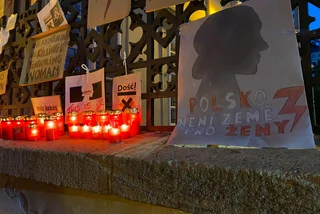Abortion is legal in Czechia, but foreign women, particularly those from outside the EU, face numerous obstacles when seeking safe and timely abortion care.
The latest report from The Abortion Support Alliance Prague (ASAP) found that out of nearly 80 state hospitals surveyed, 5 percent were uncertain about providing abortions to non-citizens. Meanwhile, 43 percent refused to offer abortion services to EU citizens, citing either legal uncertainty or restrictive internal policies.
Legal ambiguity stems from outdated laws that state abortion should not be performed on foreign nationals “temporarily” residing in the country. While EU citizens are guaranteed access, the laws for non-EU citizens are more complex. Many hospitals follow a conservative interpretation advised by the Czech Medical Chamber, leading to significant disparities in abortion access based on nationality.
“We’ve seen many non-EU residents, often with limited support networks, struggling to access services here,” says Jolanta Nowaczyk of ASAP, who tells us that non-EU nationals are frequently advised to seek care outside Czechia.
Administrative, financial, and language barriers
Non-Czech residents also face administrative, financial, and social hurdles that make accessing essential healthcare services difficult and stressful. Nearly half of hospitals require consultations to be scheduled by phone, creating barriers for non-Czech speakers and those with hearing impairments.
According to Nowaczyk, these obstacles can lead to delays in critical situations, where time is of the essence and patients are at risk of making uninformed choices.
Financial barriers also play a role. Non-EU residents who opt for elective procedures must pay out-of-pocket, and costs vary widely across the country, from CZK 2,500 in Hradec Králové up to CZK 9,300 in České Budějovice.
Surgical abortion cheaper than pills
Despite Czechia’s relatively progressive stance on reproductive rights, its approach to medical abortion deviates from World Health Organization (WHO) guidelines in both time frame and patient autonomy.
While WHO recommends medication abortion up to the 12th week of pregnancy, Czech hospitals typically offer abortion pills only up to the 7th or 8th week.
“The use of Mispregnol and Mifegyne in Czechia was approved for abortion up to 49 days, limiting medical abortion to seven weeks,” says Nowaczyk, adding that this restriction reduces accessibility and limits individual choice.

The cost of an early-stage surgical abortion in Prague is CZK 4,700, increasing to CZK 5,200 after 8 weeks. A self-administered medical abortion costs CZK 4,775.
“In most hospitals, the price of medical abortion is higher than the price of an early-stage mini-abortion,” further deterring patients from choosing the medication option, Nowaczyk adds.
Since abortion pills are not available after eight weeks, women seeking a later-stage abortion are forced to undergo a mechanical procedure at a clinic or hospital. Meanwhile, feminist organizations and the WHO agree that managing an abortion at home is both safe and empowering.
Toolbox
- Czechia’s law on access to abortion for EU citizens is here.
- Anyone denied an abortion is encouraged to appeal to the Ministry of Health or lodge a complaint with the medical facility.
- Women Help Women offers abortion pills and other services and advice.
- See the My Voice, My Choice map of collecting points.
The way forward
As abortion access faces challenges worldwide—particularly in the U.S., Poland, and neighboring Slovakia—activist groups in Czechia are working to safeguard reproductive rights and ensure women have access to abortion services regardless of their nationality.
The My Voice, My Choice campaign is pushing for EU-wide support for women seeking abortion care in countries where access is restricted. The initiative has already gathered over one million signatures and continues to gain momentum, says Keli Renaux, a French-Thai expat speaking for the Czech arm of the EU-wide initiative.
“In Czechia, abortion is still largely seen as a politically sensitive issue,” she says. “There’s support, but it’s not always vocal.” The campaign has seen more traction in France.
“It’s a widely discussed topic, and with over 100,000 signatures there, it’s less of a taboo.”
Both women note that the situation in Czechia reflects a broader trend across Europe, where conservative and far-right movements are putting reproductive rights at risk. Renaux adds that even in countries like Italy and Germany, where abortion is legal, like Czechia it's still expensive, and in some areas, the number of practitioners is limited.
Advocacy groups like ASAP and My Voice, My Choice push for more transparent policies, standardized pricing, and enhanced language accessibility, they send a clear message that healthcare in Czechia should no longer determined by nationality, financial status, or language proficiency.












 Reading time: 3 minutes
Reading time: 3 minutes 






















